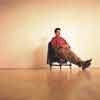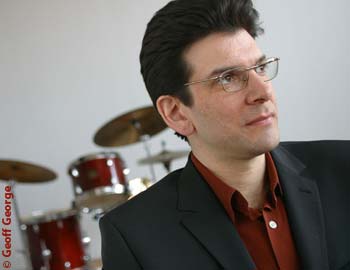| Daniel was raised in a very artistic environment, with a wealth of musical talent to inspire him.
DB Music entered my life while I was still in the womb. My father, Milton Barnes spent his life in music. He played jazz drums and guitar, later in his life he became interested in classical music, he took up conducting, and was a classical concert composer. Around the time I was conceived my father was conducting, he was involved with the Niagara Falls and St. Catharine’s symphony orchestras. My mom would go out to these performances and I was in her womb, so I think that was the beginning for me. As for drumming, when I was a young boy I discovered my father’s drums. My parents had a party one night and the kit was set up in the living room. When I got up the next morning, the kit was still there, so I tried them and I liked them. They were left set up because my mom thought I took to them extremely well. I knew by the time I was five that drumming was what I wanted to do. I just kept playing. That was further encouraged by my older brother, Micah Barnes (formerly of the Nylons, a pop acappella group). He is five years older and he was singing and playing piano. So he and I would play in the house. As a matter of fact, I played in my brother’s band from the time I was sixteen until around the age of twenty-nine or so. That was The Micah Barnes Band; we were playing the Toronto, Queen Street scene of the 80s.
I suppose asking Daniel Barnes to name the musician who most influenced him was unfair, I figured it was worth a try.
DB Some of my favourite records, the pillars of my musical influences, Wow, just one, o.k. Sonny Rollins with Herbie Hancock, Thad Jones, Bob Cranshaw and Roy McCurdy on drums, that drumming was very important to me. I would really find it hard to nail down just one. Charlie Parker and Dizzy with Max Roach’ soloing, that became a real influence. It showed me that drums could be a solo instrument. I was exposed to good stuff early, my stepfather had a good jazz collection and I would listen to that music, Coltrane. The classic Coltrane quartet was in the house. Mitch Mitchell in Jimi Hendrix's Are You Experienced, that is still one of my favourite records. Another album that was a pivotal album for me was Aretha Franklin, Live at the Filmore East with Bernard Purdie on drums. You would hear Bernard on all kinds of records. He was the root of my R& B interests. One time when I was visiting New York, I sat in at a class he was giving at the New School. He told his kids, “Write the songs.” That was a good lesson for me.
Since we were speaking of schools, I asked Daniel how his musical education progressed.
DB I’m largely a self taught person. The people that were influential in my education were Jim Blackely; he laid the foundation of how to study. To this day, I follow his drills and ideas on practice. As a teenager I wasn’t disciplined enough to stick with it. Claude Ranger, he was playing around town and I would see him perform and lead his band or play with others. He was friends with my folks and he would come over to the house and give me some pointers. I went to the Banff Summer School for two years, both years Marvin ‘Smitty’ Smith was the drum instructor. I took piano from Bob Fenton and I studied music theory with Professor Paul Read. The rest of my musical education is on the ground.
When asked what his most memorable musical experience has been to date, he was eager to talk about his time with singer Aster Aweke.
DB My tours with Aster have been the most memorable shows so far. Aster is an Ethiopian pop singer; she sings Ethiopian urban pop. Time magazine called her the Aretha Franklin of Ethiopia. She performed at world music festivals all over the world, some of the largest shows I ever played, were with Aster. We toured Europe, Africa the Caribbean and through the U.S. I did a lot of touring with her through the 90s. We would play one-month tours twice a year, at festivals like WOMAD. These were huge world music festivals; we would play to crowds upwards of fifteen thousand people. There is a lot of energy in a crowd that size. We finished this forty-five minute set in Germany, there were fifteen thousand people going crazy for us and really loving it. After our set, we watched a band called The Super Rail Band. I didn’t think it was possible but the crowd went even crazier for them, it was nuts man. Those are memories I will never forget. I haven’t travelled as much in this decade; I hope I can do more travelling.
You were telling me you were doing a show out of town, Budapest, Hungary is that correct?
DB Yes, I just got back from Budapest; I did one show with Holly Cole.
That’s too much man, travelling to Europe for one show, how do you cope with that?
DB Well it makes for an interesting weekend. You try to get the most out of it that you can, see the most stuff you can in the amount of time you’ve got. You try to stay strong for the show, you don’t sleep much, and instead of sleeping you have some beer, do some sightseeing. I don’t often plan for vacations, I just wait for these shows to come up and make the most out of them.
When asked about products he endorses he indicated that at present he was not endorsing any equipment although he would like to at some point. On his equipment preferences:
DB As far as drums go, I have spent a lot of years collecting. I have three Gretsch sets, two Yamaha sets and my fathers 1952 Ludwig’s. I like any good quality set of drums. When you hit a good Gretsch drum though there is nothing quite like them. Lots of drum companies are trying for that Gretsch sound. As far as cymbals, I like Bosphorus, they are hand made designer cymbals, I have three at the moment and I would like to have more. I also own Ufip, an Italian company that makes a really nice cymbal. I have some Zildjian cymbals as well. They have excellent cymbals and a wide variety. I’m happiest with my Bosphorus and Ufip cymbals though. They really do it for me. Jim Blackely got me into Powertip sticks, they are now known as Headhunters, I’ve been using this type of stick since I was eighteen, I’m forty-one now, it would be really hard to change to a different stick. I like Regal Tip, for brushes and mallets.
When asked what it takes to make it as a professional musician, Barnes didn’t hold back in detailing the requirements for success.
DB It’s a very hard go and you will fall by the wayside unless it is really the only thing that matters to you. You have to be so committed that all those bad odds don’t make a difference to you because you know it’s the only thing that you are supposed to be doing. It has to be the only thing you care enough about to throw yourself into it one hundred percent. You have to feel the rewards of doing it, even if they may be on some other level, not immediate financial rewards. Although sometimes you make really good money, you think, Oh my God I just made a great pay cheque for having fun. There are those times and then there are lots and lots of times, especially in the jazz world, where you make a lousy pay cheque but you can still walk away saying you had fun. What you have to do to make it in this business, is to have no interest in other things (laughing). That’s not accurate really; if you have the capacity to excel in another career you should probably explore that. There isn’t a lot of room in the music business.
What does the future look like for Daniel Barnes?
DB The new CD Classic Beauties, will be coming out in the spring. I’ve got shows in Japan with Holly Cole, that’s in January '07. I’m co-writing compositions for a new project with my older brother. I’m also doing pre-production work on that, getting more involved in the recording process. I have to line up some shows with my band in support of the new record. That’s about it for now, so it looks o.k. I am a professional musician and I’m working steady and having fun, what else is there?
|



